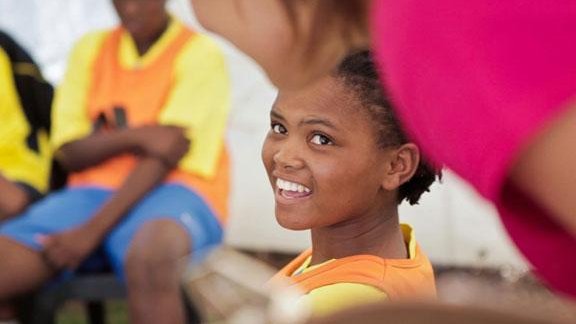The organization Girls and Football SA uses sport, media and education to foster the development of girls. (Girls and Football SA)
SOUTH AFRICA {WOMENSENEWS}-- As the founder of the award-winning nongovernmental organization Girls and Football SA, which focuses on the development of girls and young women through sport, media and education, I am an avid believer in working in a girls-only space.
Given the prevalence of rape and violence against girls and women, particularly in South Africa where our work takes place, we reinforce this idea, as it is often the only time a girl has the opportunity to speak about her feelings in a safe space away from boys or men in her life who may pose a threat. Our entire curriculum is therefore based on creating safe spaces for girls.
But safe spaces are not the world.
Often through the work we do at Girls and Football SA, I run into the threats that girls face in the patriarchal South African landscape.
At one point, in conversation with one of our donors, for instance, I was told, "The lesbian women who play football do not look like women." The donor went on to ask: "In the Scandinavian countries, they still look acceptable, but here in Africa, they do not. Why can't our female football players look like women? If they did, the men might accept them more and we could get you more funding."
It was a sobering moment that served as a reminder: While our young participants at Girls and Football SA workshops may be gaining confidence and an understanding of safe sexual behavior, their environment is not changing with them.
We cannot expect a 10-year-old girl to change all the adults in her life simply because she has been given more opportunities than before.
Seeking Society's Support
As we continue to work towards gender parity in countries that need it most, we can't forget to understand that girls, in all their glory, need the support of and change within their society. In order for us to work towards reaching gender equality, realistic expectations must be placed on girls and boys alike.
This might seem like common sense, but it actually captures a major shift in thinking that is currently underway in the push for gender equality.
For years now, we have publicized the huge social importance of supporting the girl-child. Equipped with tools for success, we have been saying a girl is able to heal her entire community. When a girl has the opportunity to go to school, make her own choices and access accurate sexual health information, we believe in her capacity to impact every aspect of her life and of the lives of those in her community.
She'd have the power, in her tiny 10-year-old body, to transform years of intricately structured and deep-rooted patriarchy.
But wait a minute, let's pause.
By reinforcing the idea that a girl "unleashed" equals unparalleled strength and power, are we setting the world up to be disappointed in girls as change agents? By focusing the entire gender parity discourse on girls, are we conveniently forgetting 50 percent of the equation: boys and men?
The discourse that applies a "Wonder Woman" mentality to a pre-teen girl is a problem. This immense pressure we place on girls to succeed beyond their male counterparts could potentially cause more harm than good, for both girls and boys. After all, overcoming gender inequalities is a shared responsibility between girls, boys, women and men.
As a passionate feminist, a fierce supporter of the girl-centered approach and a woman fully aware of the importance of a girl's education for her and her country's development, I can say with certainty that the movements we've seen creating space for girls' education are of utmost importance.
An Old Approach
The concept of a girl-centered approach as such is not new; one of the earliest game-changing campaigns for girls' education was the Meena campaign in Southeast Asia (primarily in Bangladesh and India) in the early 1990s, which strongly emphasized the need for girls to go to school. However, the Meena campaign focused on including the community in understanding a girl's potential.
From that Meena campaign, with its holistic view, we shifted to the gender equality perspective of those such as Beyonce, who sings "Who run the world? Girls!" in the 2011 song "Run the World (Girls)."
We should down shift and back up from that uproarious attitude, which is inaccurate and ultimately unhelpful.
Girls do not run the world, and so long as they are facing the patriarchal structure deeply entrenched in their home countries, their options remain limited. Placing the responsibility of the world on their shoulders only sets our work to reach gender parity up to fail.
At Girls and Football SA, we invest heavily in creating a space for safe sexuality, within a girl's community, but also within herself: ownership over her (sexual) feelings and choices is of the highest importance.
Through our work on the football pitch and in life skills-based workshops, we ensure that girls have the opportunity to understand that their sexual orientation -- whether deemed by society as "acceptable" or not – is perfectly fine. We promote healthy living, economic empowerment and self-esteem.
The girls we work with are, as per the definition of a girl-centered approach, equipped to "run the world." But this is not enough. They need a world that is ready to accept and support them for who they are.
Women's eNews is working with Women Deliver to spotlight changemakers who are participating in Women Deliver 2013, taking place May 28-30 in Kuala LumpurMalaysia. Women's eNews managing editor Juhie Bhatia will be moderating a conversation on Web-based advocacy, activism and storytelling at the women's health conference on May 28.















